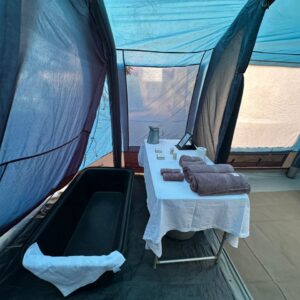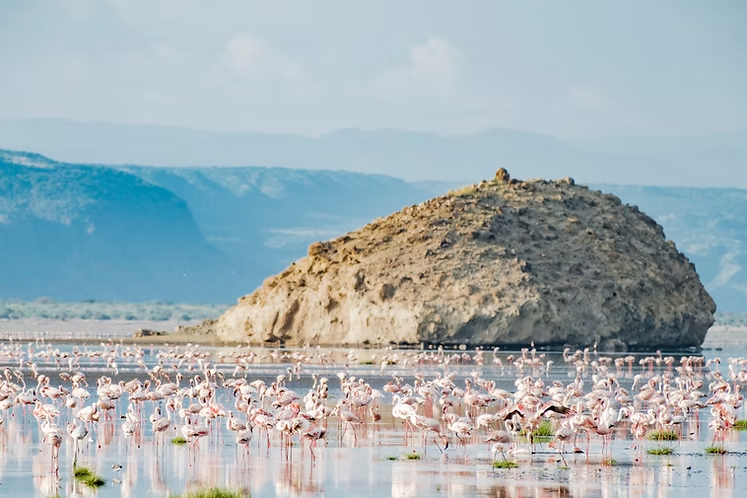To make the most of your African safari, choose the right time and destination for your desired wildlife viewing, plan your itinerary with a minimum of one week, and pack light layers of practical clothing for warm days and cold nights. Invest in good camera gear, including binoculars, to capture memories, but also make time to simply enjoy the experience with your guide, including sundowners and starlit skies. Prepare medically for your trip, bringing necessary medications and getting recommended vaccines.
An African safari is not just a trip. It’s a sensory shift, a reminder that the world runs on rhythms older than any city’s pace. The silence before a lion’s roar, the grit of dust rising behind a herd of elephants, the sudden glow of sunrise over acacia trees — each moment asks you to move more slowly and pay deeper attention. Yet experiencing this fully takes more than tickets and binoculars. You need a plan to make the most of your next African honeymoon/couple Safari Vacation plan that respects the land, honors the wildlife, and keeps you aligned with the unpredictable pulse of the bush. Here’s how to set yourself up for a safari that feels less like a vacation and more like an initiation.
Deciding When to Travel
Animals move differently when water is scarce, and that matters for how much you see and feel. If you want dense gatherings of wildlife, opt for dry-season waterhole traffic, because herds will travel for miles to the few reliable watering spots, and predators know this, too. The concentration creates drama: antelope frozen in the gaze of lions, elephants crowding a shrinking pool, birds lifting in waves when crocodiles shift in the shallows. Pick your season wisely, and the land itself becomes your teacher.
The best time for an African safari depends on the desired experience, but generally, the dry season (June-September in East Africa, May-October in Southern Africa) offers excellent wildlife viewing as animals gather at water sources. However, the rainy season (typically November-May) brings lush scenery, baby animals, migratory birds, and fewer crowds, often at lower prices. Research specific regions and tailor your plans to your interests, such as wildlife, birdwatching, or iconic events like the Great Migration, and book accommodations well in advance, especially during peak times first-time safari tips. April and May are long, heavy rains, and it is not the best Time for African Safaris.
Organizing Digital Essentials
Amid the romance of the bush, the practical details still matter. Travel permits, medical records, confirmations, and even simple itineraries need to be ready when there’s no internet and the only light comes from a kerosene lamp. It’s helpful to know the best ways to convert files to PDF, allowing you to store everything securely for the best African safari holidays, share it with your guide, or access it offline. Having your documents neatly portable keeps stress at bay when focus should stay on the lion crossing the road ahead or the thunder of hooves across the plain. Organization is a form of respect for yourself, your companions, and the journey itself.
How to plan an African safari? To plan an African safari, first, define your interests and budget, then choose a specific country and the time of year to visit. Next, select a reputable tour operator or planner to help with an African family, honeymoons/couples, luxury, mid-range, photos, budget safari holiday, prices, costs, itinerary, map, vacation packages all-inclusive, flights, and lodges, as they often have insider knowledge and can coordinate complex arrangements. Finally, prepare by getting necessary vaccines, purchasing travel insurance, and packing appropriate gear like layered clothing in neutral colors and insect repellent.
Timing Drives for Activity
To maximize your African safari experience, schedule game drives around sunrise and sunset. These are the coolest times of day when animals are most active and visible, either grazing, drinking at waterholes, or hunting. Safari days are structured around these morning and late afternoon drives, typically starting before dawn and ending after sunset. It’s tempting to sleep in when the lodge bed is soft and the nights are cool, but the bush doesn’t run on your schedule. Life stirs with the first light, and that’s when you should be there to witness it.
You’ll get far more out of your safari if you book early-morning drives because predators still move on the hunt and the grazers haven’t yet retreated into shade. The air feels sharper, the light more forgiving for photographs, and the experience becomes less about checking animals off a list and more about inhabiting their world as it wakes.
What To Expect: A Typical Day on Safari in Africa: A typical day on an African safari starts before dawn with a wake-up call for a thrilling morning game drive, followed by breakfast back at the lodge and downtime during the midday heat. The afternoon brings high tea or snacks, leading to a late afternoon or evening game drive, which might include sundowners and potentially a night drive to see nocturnal animals. Between drives, you have time to relax, swim, or enjoy cultural visits at your camp or lodge.
Mixing Safari Settings
A safari isn’t one thing, and it shouldn’t be treated as such. National parks have rules that preserve balance — no off-road driving, no night explorations — while private lands offer flexibility and intimacy. To taste both freedom and form, mix a private conservancy and park in your itinerary. In a conservancy, you might follow fresh leopard tracks into brush or sit quietly at a hide until rhinos emerge, while a national park offers the majesty of scale, landscapes that hold ecological stories too vast to bend for individuals. Combining making the most of your next African seniors Safari Vacation them gives you contrast: the freedom of improvisation balanced against the grandeur of protection.
For your next African safari, consider adventurous activities such as game drives, walking safaris, and hot air balloon safaris. Other unique adventure things to do on your next African safari trip include horseback riding, water safaris like canoeing or mokoro rides, and night game drives to see nocturnal animals; these are the top adventurous safaris in Africa. You can also get closer to wildlife on elephant back safaris or by visiting local villages for cultural immersion.
Choosing the Right Destination
Not every safari country tells the same story. Some landscapes are about spectacle, others about intimacy. If you crave space, silence, and fewer human voices around you, Botswana offers fewer crowds and carries a reputation for low-volume, high-quality safaris. The Okavango Delta shifts with the floods, creating islands that lure game and predators in equal measure. Compare that with Kenya or Tanzania, where the migrations paint the horizon with wildebeest and zebras in staggering numbers. Your choice determines not only what you see, but how you feel about the land itself — whether it envelops you with stillness or overwhelms you with motion.
Add on tips: Tips for Your First African Safari & Things to Know Before You Go., For a first-time African safari, choose your destination and timing wisely, focusing on what wildlife you want to see and the appropriate season for that goal. Pack light and in neutral, layered clothing (avoiding blue and camouflage), bringing essential items like sunscreen, a hat, binoculars, and a zoom lens. Prioritize making the most of your next African solo Safari Vacation health and safety by getting necessary vaccines and travel insurance, but most importantly, always listen to and follow your guide to stay safe and respectful of the environment and animals.
Embracing Local Culture and Guides
To maximize your African safari, embrace the local culture and hire qualified, local guides for their unique insights into wildlife, culture, and the environment. Engage with local traditions by participating in cultural activities like tribal dances, cuisine workshops, and craft demonstrations. Respect the natural environment by following your guide’s instructions, maintaining safe distances from animals, and taking your trash with you.
A safari is not only about animals. It’s also about the people who know the land with the intimacy of living, making the most of your next high-end African Safari Vacation experience. Spending time with guides who grew up on these landscapes transforms what could be a distant observation into a layered understanding. I once listened as a female guide reshaped my perspective by weaving her personal journey into the story of lions she tracked. Her insight carried more than facts; it carried resilience and belonging. Their voices connect you not only to the wildlife but to the broader meaning of the place.
Relaxing into Safari Rhythm
The most common mistake travelers make is trying to rush the wild into performance. Safari works best when you surrender. The goal is not to tick boxes but to discover the slow safari ethos, where stillness becomes the lens through which life emerges. You may sit for an hour watching a herd of elephants graze, only to find the smallest calf stepping into a puddle with comic seriousness. Or you might wait at a lagoon until dusk falls and realize the calls of frogs create a symphony as moving as any lion sighting. Patience doesn’t just reward you with moments; it rewires your sense of time.
A safari is not a theme park. It is a passage. The choices you make before you arrive — the season, the settings, the rhythm you adopt — shape not just what you see but how you remember it. If you move too quickly, you’ll miss the subtle drama unfolding beneath the obvious. If you plan without regard to culture, you’ll lose the human stories that deepen the experience. Yet, if you balance practicality with presence, organization with openness, the land itself will welcome you into its cycle. And when you leave, you won’t feel like you checked something off a list; you’ll feel like the wild checked something into you.
Work with a specialist
To make the most of your African safari, work with a specialist who can tailor the trip to your travel style and budget, as they offer expert knowledge of destinations and operators, saving you time and ensuring a better experience. Research top destinations like Kenya, Botswana, or Tanzania, consider reputable tour operators for different budgets, and book well in advance, especially for luxury or peak season travel. Find a tour operator with excellent reviews to ensure a well-organized and safe experience. Embark on an unforgettable adventure with Foot Slopes Tours and explore the breathtaking landscapes and wildlife of Tanzania with tailor-made safari packages that suit every budget and preference!
Packing for the Safari
To pack for an African safari, choose neutral-colored, lightweight, and layerable clothing like long-sleeved shirts, pants, and a fleece jacket for protection from the sun and chill. Essential accessories include a wide-brimmed hat, sunglasses, binoculars, a camera with extra batteries, and a universal power adapter. Pack a soft-sided duffel bag instead of a suitcase and include a daypack, sunscreen, insect repellent, and personal medications. Hand Sanitizer & Wipes: Useful for keeping clean on the go.
Ultimate African Safari essential travel tips: To prepare for an African safari, consult a doctor for necessary vaccinations and malaria medication, plan your trip around peak wildlife viewing seasons, book a minimum of one week for your safari with a rest day upon arrival, and pack light in layers with neutral-colored, loose-fitting clothes. You should also bring essential gear like binoculars, a good camera with a zoom lens, sun protection, insect repellent, and a basic first-aid kit, and remember to bring cash for tipping staff.
Communicate with your guide
To maximize your safari experience, actively communicate your interests and needs with your guide, but always follow their instructions for safety and respect the environment. Share your preferences for photographic opportunities, birdwatching, or even pacing to tailor the trip, and ask questions to enhance your knowledge. Be grateful, ask for recommendations, and respect their expertise by not making unreasonable requests like going off-road. Beyond safaris, Africa offers diverse attractions, including cultural experiences from meeting with local communities to diving deep into the grandeur of untamed nature, venturing to a mountain peak, or lounging on a white-sand beach, among the unique and top things to do in Africa beyond safari.
Don’t forget the tips
To make the most of your African safari, choose the best time to travel, plan at least a week to avoid a hectic trip, pack light in layers of neutral-colored clothing, and bring essential gear like binoculars, a good camera with a zoom lens, and insect repellent. Prepare for the unpredictable weather, sun, and dust by applying sunscreen, wearing a hat, and dressing in layers of loose-fitting, earthy tones. Be ready to wake up early for active wildlife, embrace patience for unexpected delays, and always follow your guide’s instructions for safety and to enhance your experience.
Travel tips highlight: For a 2-week African honeymoon/couples, family, combine East Africa with a beach escape for diverse romantic experiences, or explore an East African safari focused on Tanzania’s Serengeti and the romantic beauty of the Ngorongoro Crater. Another option is a safari followed by a tranquil Indian Ocean Island stay, or focus on the dramatic landscapes of Mount Kilimanjaro for a unique landscape and wildlife adventure.
A Beginner’s Guide to Planning Your First African Safari
A beginner’s guide to planning your first African safari helps you navigate essentials like choosing the right destination, best travel season, and type of safari—whether luxury, mid-range, or budget. It covers booking with reputable tour operators, preparing documents, vaccinations, packing smart, and setting realistic expectations. From making the most of your next African comfort mid-range Safari Vacation, thrilling game drives in iconic parks like Serengeti and Maasai Mara to cultural encounters, this guide ensures your safari is safe, memorable, and tailored to your travel style.
To prepare for an ultimate first-time African safari, book a reputable guide, get necessary vaccinations, and secure travel insurance. Pack light, neutral-colored, layered clothing made from natural fabrics like cotton to protect from the sun, insects, and temperature changes, along with a wide-brimmed hat and closed shoes. Bring sun protection, insect repellent, a camera, binoculars, essential medications, and copies of your passport.
Where to go on an African safari?
The Serengeti National Park, Tarangire National Park, Ngorongoro Crater, Lake Manyara National Park, and Arusha National Park are all located in Tanzania’s Northern Safari Circuit, which offers making the most of your next African luxury Safari Vacation excellent wildlife viewing opportunities, including the Great Migration in the Serengeti and the Big Five in the Ngorongoro Crater photographic destinations for capturing the magic of an African Safari. Combining a safari with a relaxing stay on Zanzibar’s beautiful beaches is a popular way to make the most of your next African budget Safari Vacation and a highly recommended option to experience both wildlife and coastal beauty.
8-Day Luxury Tanzania Family Safari Journeys Beyond Ordinary
High-End African Safaris
Tanzania Family Safari Vacations
Best African Safari Vacations, Tours, Trips & Luxury Travel 2025/2026
10 Best Tanzania Tours & Vacation Packages 2025/2026
How to Apply for a Tanzania Visa: A Step-by-Step Guide?
To apply for a Tanzania eVisa, visit the official Tanzania Immigration Department eVisa portal, start a new application, and fill out the online form with your personal, passport, and travel details. Upload your passport copy, photo, and onward ticket, then pay the visa fee online. You will receive a confirmation email, and after approval, your eVisa will be sent to your email.
Final Thoughts on Making the Most of Your African Safari Vacation
A safari is more than just a holiday — it’s a life-changing journey into the wild heart of Africa. By choosing the right destination, timing your trip wisely, preparing properly, and embracing every moment, you can ensure your safari vacation exceeds expectations. Whether it’s your first safari or a return trip, Africa’s magic always delivers something new.








